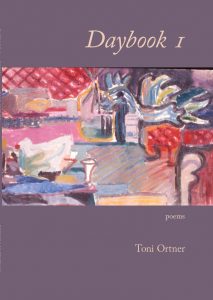From the back cover
The writing in Toni Ortner’s Daybook I is lyrical but rooted in present tense, observations deeply felt.
It consists of spiritual musings, political musings, musings about Life. The writing is unselfconscious, but finely hewn.
Many of the passages, though written in paragraph form, read as poetry. The poems can be satisfyingly evocative: The hot cup of coffee you brought to my bed/how you said the dead are always with us/if we listen to the voices in our heads/how in spite of the depth of the wound you never cried/the dark into which I fly/the light in your eyes.
At times it's difficult to tell if a scenario is imagined or “real” which for me enhanced my engagement and enjoyment. After all, the imagined can seem to the imaginer more real than “reality;” dreams can take on a life of their own and impact our relationship with the embodied world. Ortner seems to find expansion, reflection in the dream world. It adds a rich texture to the passages here. There can be deadpan humor when imagination mixes with the banal as in recollecting the figure of Death from a dream: He stood there with a raincoat slung over his shoulder. He was chewing gum. It smelled like Dentine.
That it is all together in Daybook I—dream, thought, memory, event creates a fluid landscape that captures well the interstices between a rich inner life and its sometimes difficult-to-navigate outer manifestations.
—Arlene Distler
In Daybook I. Toni Ortner gives us apocalyptical visions, truths from the kind of life our society has lead, leads now and could lead. In Daybook all of us become immigrants in the journeys of our own lives, where we may be cast in Noah’s ark upon a sea of deep despair. These prose and free verse poems grieve the larger world as well as they grieve the poet’s loved ones, among them her mother and father. The muse wants to sing “the hum of the world as it turns.” We must remember we are what we are, and we all could be braver than we are.
—Tim Mayo
This would be Steinbeck if he hadn’t fooled around in other people’s kitchens. This is a full-score Cohen with two more notes, not reaching anywhere, but ever taking in. The words come humming out of the dark to shatter crystalline on the floor as sharp edged duo-tone fridge magnets familiar and mysterious as if designed by Paul Klee — not made in China or the Old Country, made in the Wild East of New York is more like it. There are hiding demons in the text waiting to pierce you, and there are non-resident angels flirting with sin.
—Phil Innes, Vermont Views Magazine
